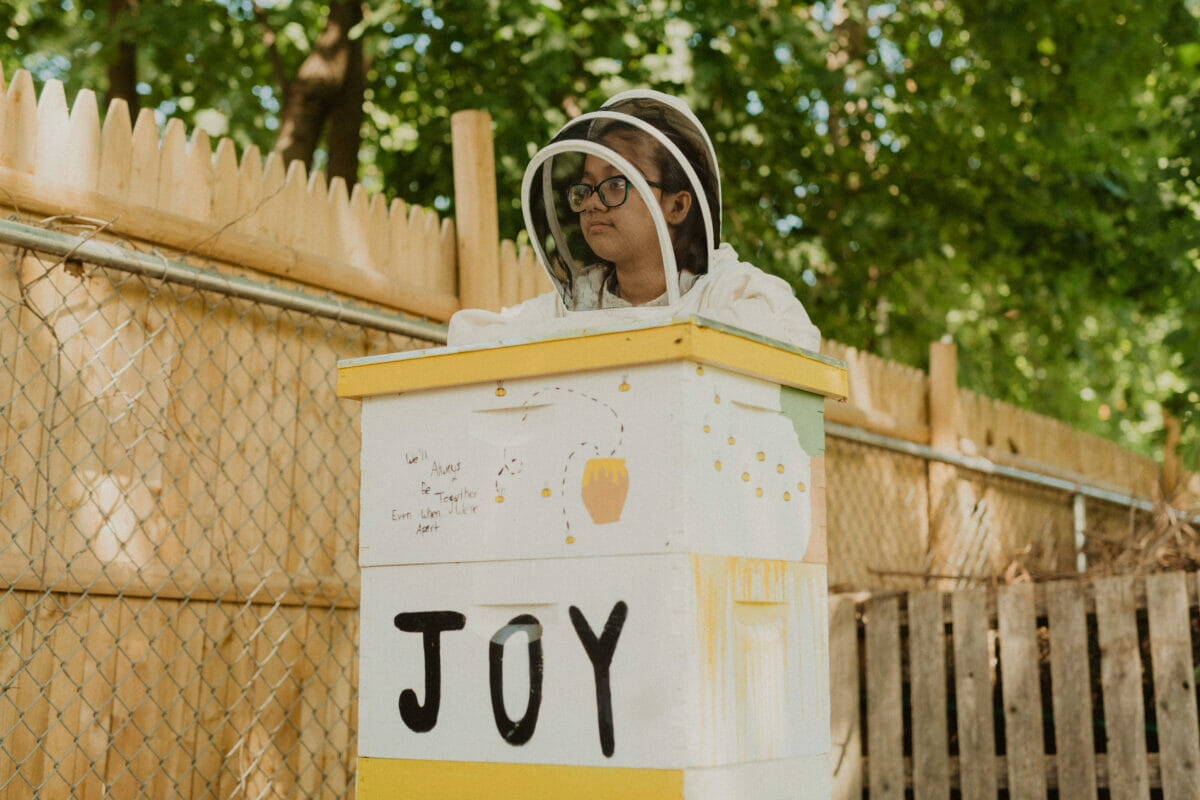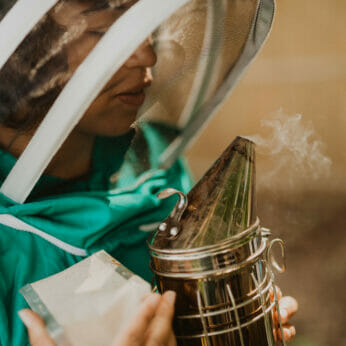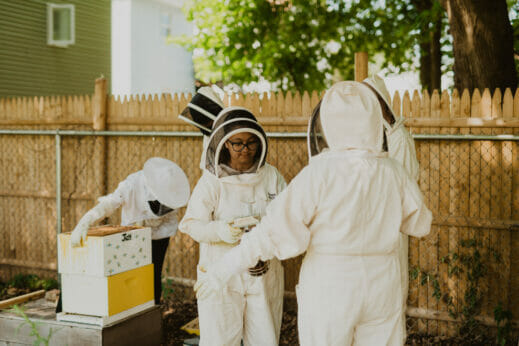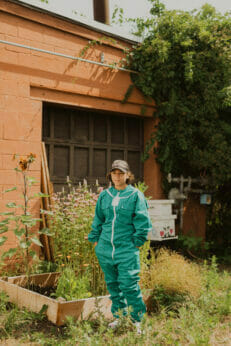In New Haven, Connecticut, the Huneebee Project is connecting youth with job skills, nature, and themselves.

Spending 15 weeks surrounded by bees wasn’t Maria Roman’s plan for the summer. The New Haven, Connecticut-based teenager was going through a lot when a family friend suggested she participate in the Huneebee Project, a beekeeper-in-residence program that offers young people the chance to interact with bees while learning essential life skills.
Roman had recently entered the foster care system and found herself drifting away from things she once loved, such as spending time outside. She recalls thinking, “You seriously want me to be around bees? Definitely not.”
With no prior pollinator experience, Roman was apprehensive. “I knew they stung and to get away from them if they’re close to you.” But by her fifth week in the program, Roman had warmed up to the bees, finding them therapeutic.
“The sound of the bees is really relaxing,” says Roman. “It’s calming.”

New students don’t get into a bee suit for weeks. First, they work on social and emotional skills. (Photo: Grey Kenna)
Started by clinical social worker Sarah Taylor in 2018, the Huneebee Project is a therapeutic job skills training program that has graduated 25 cohorts, including Roman, from the 15-week program over the past five years. It’s also installed roughly 30 honey bee colonies across seven sites in the greater New Haven area, planted pollinator-friendly garden plots and launched an online marketplace that sells honey made from the hives, candles and a curated selection of other artisan products.
Participants range in age from 15 to 23, and the project prioritizes enrolling children and young adults with past or present child protective and foster care involvement.
Taylor had long dreamed of creating a nonprofit for youth who are aging out of the foster care system. But it wasn’t until she took time for herself that she realized the therapeutic potential of beekeeping. Burnt out and disheartened with the foster care and child protective services systems, Taylor started keeping her own bees while working and attending a fellowship program in New Haven.
“After a day of work, the only place I wanted to be was with my bees,” says Taylor. “It became a meditative practice for me. They’re their own form of therapy.”
The Huneebee Project became Taylor’s opportunity to combine her love of beekeeping with her professional background.
The students are responsible for about 30 hives, although they are working on expanding to 50 hives by the end of summer 2023 across seven official garden sites in New Haven neighborhoods where the youth live. They also now have community hive checks where locals can join in checking on and learning about bees. It’s one more place to create a network and sense of community for the teens and the bees.
“It was really important to have the gardens where youth live so they would be accessible and create spaces where they can have a sense of ownership,” says Taylor.

Students are responsible for taking care of 30 bee hives throughout the greater New Haven area. (Photo: Grey Kenna)
Over the years, the programming has evolved as participating youth have given feedback. The program runs each summer and is purposefully small, with about six students taking part. The students must attend at least 75 percent of the workshops to graduate and are matched with a mentor who provides encouragement throughout the program and helps with practicalities such as transportation and breakfast.
“These are kids that are often not going to school or are struggling to get out of bed or are extremely socially anxious. The mentors encourage them, they help with transportation and even get them something to eat. The intensive individual attention is so important,” says Taylor.
Students don’t even get into a bee suit for the first weeks; instead, according to Taylor, they spend time forming relationships, understanding their feelings and their body’s responses to emotions, such as fear, and identifying what they need to regain a sense of control.
“We have these 15-, 16-year-olds who are used to pretending to be tough, but it’s hard to pretend to be tough around the bees, and it allows for more authentic conversations around fear,” says Taylor. “When someone with a trauma history has that fear response activated but can regain a sense of control, I believe that is healing.”
Since starting the project, Taylor has watched students heal, graduate with professional skills they take with them to college or new jobs and blossom.
For Alex Guzman, who graduated from the program in 2019 and continues to work at the Huneebee Project as junior bee instructor while attending college, the experience helped teach her skills she continues to use today.
“I’ve learned how to socialize in a more professional setting, and I’ve also gathered a lot more patience,” says Guzman. “I have been handling my mental health, learning when to set a boundary or take a break when I need to and take a breather.”

After participating in the program, Maria Roman hopes to keep her own bees one day. (Photo: Grey Kenna)
They’re skills she’s learned from interacting with others in the program and the bees themselves.
“You have to be really patient when you approach bees and to take your time,” says Guzman, “kind of like when you’re dealing with any living thing. Everything I’ve been doing with the bees has contributed to developing those [socialization and patience] skills.”
Students also learn practical office skills, such as using a printer or a coffee maker, that are easy to take for granted but intimidating if you’ve never used them.
“I look at myself now and, sometimes, I feel like I’m ready to be a boss,” says Roman, who adds that she would someday like to have her own house with bees that she could take care of and eventually, if she has children, teach her kids about.
Sounds good, hope it will happen in more places. We need all the honeybees possible.
I’m interested in bee’s,